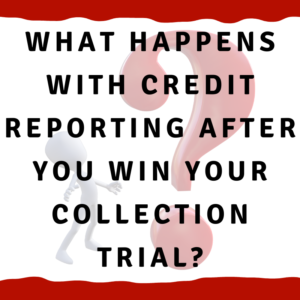What happens with your credit report after you win your collection trial?
What happens with your credit report after you win your collection trial?
When you are in court and you win, what happens with your credit report after the trial? You want the debt removed from your report, but how does this happen?
Do you ask the judge?
Does this happen automatically?
In this post, we’ll discuss how to wrap things up after you win.
You’ve won your court case. What happens with your credit report now?
The judge does not control your credit report.
The judge will not say “Now that the defendant has won, I will tell Equifax, Experian, and TransUnion to fix the credit report.”
This is not the judge’s responsibility.
All the judge does is issue the order saying that you won.
In Alabama, you have 2 possibilities for what you could do with that order.
Option 1: wait to see what the debt buyer or original creditor does with your credit report.
30 days after you beat them in trial, they update your report. What does it say?
Did they delete the debt? Is there a balance?
What do they report 60 days after? 90 days after? 120 days after?
At some point during this process, you may stop and say, “They lost. They know they lost. They hired a lawyer. I even have a copy of the court order to prove it.”
They never should have updated the account on your report. They should have immediately deleted it.
If they updated in 30 days, maybe we just sue them.
If it’s a debt collector, we sue them under the Fair Debt Collection Practices Act (FDCPA).
Specifically, we sue them under FDCPA section 1692 e(8).
Basically, 1692 e(8) says that a debt collector cannot credit report information that they know is false or that they should know is false.
For example, if you dispute a debt, the debt collector must mark it as disputed on your credit report.
If a judge has said that you do not owe this debt, then this should certainly not be on your credit report.
Sometimes we just sue them for this.
Many times, we will dispute the debt first.
What you say in your dispute will differ depending on your situation.
Option 2: write a detailed letter to the credit bureaus.
Another possibility is that you could send a letter to the credit bureaus telling what has happened.
In your letter, you say, “Midland Funding sued me. Here is a copy of the lawsuit concerning this particular account. I defended that case and I won. Here is a copy of the judge’s order saying that I do not owe this debt. Remove this debt from my credit report.”
If the credit bureaus say they will not remove the debt from your report, we would sue both the credit bureaus and the debt buyer.
We sue both because they have all violated the Fair Credit Reporting Act (FCRA) if you have shown that you were sued and won.
In most states, if you win a case that means you were not guilty of whatever you had been accused of.
They accused you of owing $5,000 to the debt buyer.
You went to court and won. You do not owe this money.
It should be removed from your credit report.
Instead of sending a detailed letter, you could submit a general dispute.
In this dispute, you would say that the debt buyer (Midland Funding, Portfolio Recovery, LVNV, or whoever it is) knows you do not owe them money.
You would tell the bureaus to check with the debt buyer to verify you do not owe the money, and that you want this removed from your report.
In my opinion, that is not really enough proof to sue the credit bureaus if it doesn’t get fixed. You haven’t provided the bureaus with enough proof.
However, you could certainly sue the debt buyer who told the bureaus to keep the debt on your credit report even though they knew they lost in the trial.
These are your two options for dealing with your credit report after winning a collection lawsuit in Alabama:
- Wait to see if the debt buyer removes the account on their own. If they do not, then sue them under the FDCPA.
- Submit a dispute letter to the credit bureaus, then sue under the FCRA if your credit report is not fixed.
If you have recently been through a collection lawsuit, it is important to look at your credit report.
Currently, through April 2021, you can pull your full credit reports for free every week.
I recommend doing this even if you aren’t currently involved a lawsuit.
Make sure what these companies report about you is accurate.
Thanks for reading!
If you are interested in learning more about consumer law and how to protect yourself, consider subscribing to our YouTube channel.
If you live in Alabama and you have any questions, feel free to get in touch with us.
We would be glad to help you in any way we can.
You can reach us by phone at 1-205-879-2447, or you can fill out a contact form and we will get in touch with you quickly.
Have a great day!
